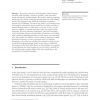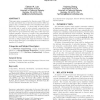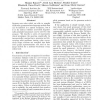9455 search results - page 99 / 1891 » The Modelling Language Zinc |
UAI
2008
15 years 3 months ago
2008
Formal languages for probabilistic modeling enable re-use, modularity, and descriptive clarity, and can foster generic inference techniques. We introduce Church, a universal langu...
114
click to vote
ALIFE
2010
15 years 16 days ago
2010
We present a model of social learning of both language and skills, while assuming—insofar as possible—strict autonomy, virtual embodiment, and situatedness. This model is built...
110
click to vote
ICTIR
2009
Springer
15 years 8 months ago
2009
Springer
We address the problem of online term recurrence prediction: for a stream of terms, at each time point predict what term is going to recur next in the stream given the term occurre...
111
click to vote
EMSOFT
2007
Springer
2007
Springer
Leveraging synchronous language principles for heterogeneous modeling and design of embedded systems
15 years 7 months ago
This paper gives a semantics for discrete-event (DE) models that generalizes that of synchronous/reactive (SR) languages, and a continuous-time (CT) semantics that generalizes the...
101
click to vote
COLING
2000
15 years 2 months ago
2000
Systems now exist which are able to con:pile unification gralmnars into language models that can be included in a speech recognizer, but it is so far unclear whether non-trivial l...



